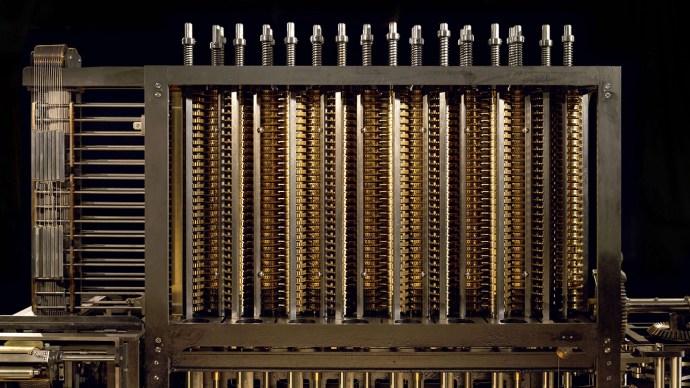Augusta Ada King, Countess of Lovelace – mathematician, writer, icon for gender equality in technology and owner of a fantastic name – is celebrated today for her pioneering accomplishments in science and technology.

Ada Lovelace tends to be dubbed the world’s first computer programmer. In 1843, she translated a French text by the Italian mathematician Luigi Menabrea on the British mathematician Charles Babbage’s Analytical Engine. In her translation Lovelace appended a series of notes explaining the workings of Babbage’s early computer. These ended up being twice the length of the text itself, and in one section describe an algorithm that the Analytical Engine could use to compute Bernoulli numbers.
(Above: Detail of Babbage’s Difference Engine)
Although the machine was never built, and the code never tested, the sequence of operations outlined this section are often cited as the first ever tailored for use with a computer. The notes also showed Lovelace’s conceptual awareness of the Analytical Engine’s potential:
“The Analytical Engine has no pretensions whatever to originate anything. It can do whatever we know how to order it to perform… But it is likely to exert an indirect and reciprocal influence on science itself.”
Lovelace as symbol
While Lovelace’s personal story is a fascinating one, within the past decade she has become a symbol for a larger subject matter.
Ada Lovelace Day was founded in 2009 by the social software consultant Suw Charman-Anderson, both as an attempt to shine light on a pioneering Victorian technologist and as a way to bring attention to the contributions of women throughout the history of science and technology.
To celebrate the day, BBC Radio 4 will be broadcasting a reading of Lovelace’s letters by Oscar-nominated actress Sally Hawkins. Women from across the globe are sharing their experiences of working in subjects ranging from electron microscopy to archeology on Twitter via the #AdaLovelaceDay hashtag.
In fields where women tend to be underrepresented, it’s an important occasion to battle unconscious (and perhaps conscious) biases and preconceptions about the people working in our universities and labs. Why is this important? Because, as Stewart Mitchell writes, a low-level acceptance of sexism, from schools to blue-chips, is pushing women away from careers in tech.
Disclaimer: Some pages on this site may include an affiliate link. This does not effect our editorial in any way.











